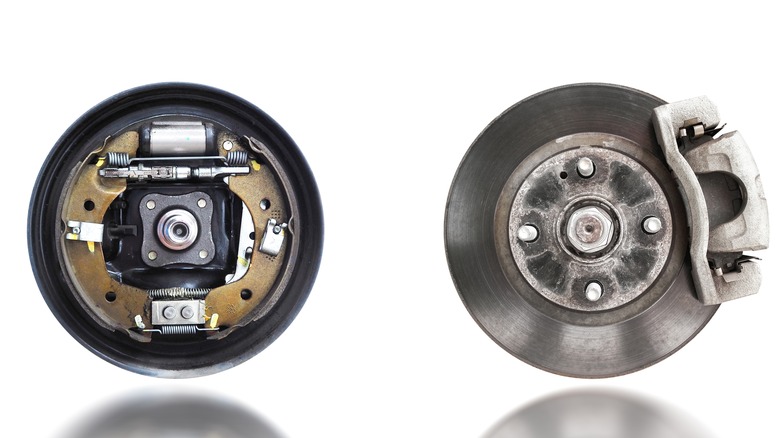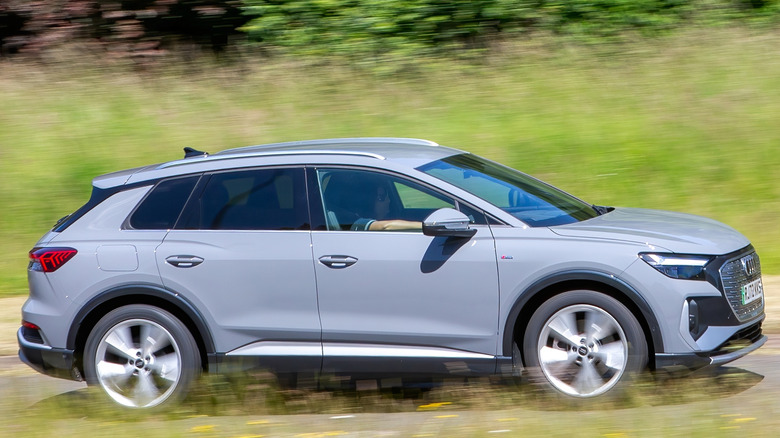
There's surprising old-school technology making a comeback on some of Volkswagen group's most important EV models, headlined by the Audi Q4 E-Tron – drum brakes. The technology's reappearance on a $51,095 (including $1,295 in destination cost) SUV highlights the solution's unique characteristics that make it especially appropriate for today's EVs.
Drum brakes were first deployed on cars in the early 1900s, originally by Maybach and then patented by Renault. As the auto manufacturers themselves explain, where disc brakes operate by a caliper squeezing a rotating disc, drum systems rely on pads being pushed outwards toward a rotating drum, generating the friction required to slow the car. While that may sound more complicated, drum brakes are in fact far simpler and cheaper to maintain and are likely among the first things people learn to fix on their car.
Drum brakes have some cons, especially their inability to dissipate heat in hard braking situations compared to the far more common disc brakes. Drum brakes are so notorious for these performance disadvantages that they are routinely mentioned as a feature to avoid when shopping for new cars, but VW clearly sees some key attributes that outweigh these disadvantages.
 BLKstudio/Shutterstock
BLKstudio/Shutterstock
While disc brakes were largely adopted in modern automobiles for their performance enhancement over drums, today's EVs have two key technologies that allow manufacturers to consider reapplying the simpler drum technology, brake by wire and regenerative braking. The Audi Q4 E-Tron can generate a deceleration of 0.3 g-force, a standard measure for acceleration or decelerations, in its four-wheel-drive variants simply by turning its electric engine into a generator, using the car's forward momentum to recharge the battery, gradually slowing the car without requiring any effort from the braking system.
To put that in perspective, that would slow the car from 60 mph to 40 mph in about three seconds. That's far from what would be required in a panic stop, but more than enough to slow when approaching a stop sign or traffic on the highway. Combine that with brake by wire, where the car's computer decides how much to leverage regenerative braking versus physical braking force, and the car can significantly reduce the demands on its braking system as a whole, and especially on the rear axle.
A secondary benefit to the drum brakes is their reduced rolling resistance. The pads in a disc brake system can and frequently do ever so slightly brush up against the rotating disc. That's perfect for responsive brake feel, but inefficient for EVs looking to eke out every last mile of range.
 Sue Thatcher/Shutterstock
Sue Thatcher/Shutterstock
While drums have reappeared on the Audi and also the Volkswagen ID.4, they only do so just on the rear axle, where the advantages of that system can be most pronounced. The front brakes still leverage the superior performance of disc brakes. Front brakes are responsible for at least 60% of the force required to stop the vehicle and it could be more depending on manufacturer configuration, so the performance advantages of disc brakes are essential there.
Manufacturers have the opportunity to further influence that figure by changing the brake bias, the difference in force applied at the front versus the rear of the car, to put even more of the burden on the front of the car. That allows the braking system on the rear wheels to be as simple, light, and durable as possible. Considering their simplicity, lower cost and reduced drag attributes, drum brakes are a perfect fit in this context.
















